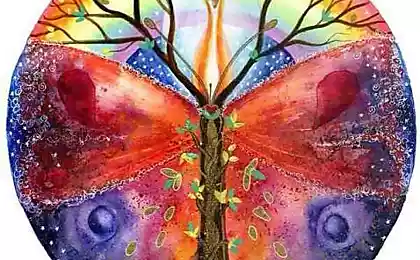225
14 Truths You'll Understand If You're Honest With Yourself
Description: In this article, we will look at 14 important life truths that are revealed to a person who decides to live in harmony with their feelings and thoughts. The author shows how honesty with oneself helps to realize limitations, potential, emotional blocks and strengths, and leads to inner freedom and growth.

Introduction
When we talk about honestyMost often we mean truthfulness towards others. But an even more important element in becoming a person is honesty with yourself. To be sincere by looking into our own eyes is not an easy task, because it requires us the courage to accept our weaknesses, doubts and even fears. But the reward we receive is freedom from illusions and a powerful impetus to self-development.
As soon as we stop deceiving ourselves – justifying inaction, ignoring internal contradictions and putting comfortable “labels” on life – the sense of reality changes: unnecessary noise disappears from it, and genuine clarity and the ability to control our fate come to the fore. In this article, there are 14 lessons that often come when a person decides to be honest with himself. These are not magic spells for instant transformation, but rather reminder It's about what thoughts and feelings we might encounter along the path of self-discovery. If at least one of these points resonates in your soul, then you are already making an important step forward.
1. You know that not all dreams are yours.
Sometimes we pursue goals that our parents or society have “introduced” into us. For example, someone dreams of becoming a doctor “according to family tradition”, but in fact since childhood he loves to draw and dreams of an art school. If you’re honest with yourself, you recognize that this “goal” is not yours or joy. Yes, it is difficult to change plans, because often a lot of energy is invested in the “alien” dream. But realizing your true passion is the first step to living a more fulfilling life.

2. Mistakes are part of the way, not a reason to blame yourself
Self-criticism can be useful: it helps us not to lose our heads and not to get lost in reality. But if you turn it into torture and constant self-blame, there will be no trace of development, only depression and fear of action. Self-honesty suggests that any mistake is a valuable experience, not a “final verdict.” Confessing to ourselves in the wrong step, we get the opportunity to analyze the reasons and move on, without remaining in the swamp of guilt.
3. Your resources are not infinite.
Many of us believe that “just a little more effort and we’ll get through it.” But the body and mind have their limits. Honesty with oneself means admitting that we can’t do everything and satisfy everyone. relax Or redistribute tasks. Ignoring this fact often leads to burnout and frustration.
4. You don’t always have to wait for “perfect conditions.”
An honest look at the situation often reveals that the “justification” of not having a perfect time, place, or associates is only a way to put off the business we fear to begin. In fact, there will never be perfect weather, full understanding from others, or a complete lack of risk. If we're honest, we admit, "I'm willing to do what I can now with what I have."
5. Relationships require reciprocity
Be honest: If you spend a tremendous amount of effort keeping someone in your life, but don’t get a return, maybe that relationship just isn’t working. This applies to friendships, romantic relationships, business partnerships. Honesty suggests that reciprocity is the key to healthy contacts, and if it is not, you should reconsider the format of communication or set boundaries.
6. Your "yesterday" doesn't define "tomorrow."
An honest person understands that the past affects us. not determines. The habit of writing off everything as “it was difficult before” or “I was unlucky as a child” prevents development. Yes, injuries and circumstances shape us, but honesty says, "Now I choose what to do." This awareness is empowering.
7. Not everyone who praises you is a friend.
The world is nonlinear: there are people who can praise you for selfish reasons, and there are those who are critical, but do it sincerely to help you grow. Honesty with oneself will allow one to recognize when praise is false or when “criticism” is a manifestation of genuine concern. Intuition and open eyes will help not to confuse flattery with real support.
8. Self-control is more important than “proof” to others.
Often we do something not because we want to, but to prove to the world our worth. But if you ask yourself the honest question, “Why do I so desperately need someone else’s approval?” you’ll find that inner self-confidence is far more effective than chasing status symbols. The more we develop self-control—the ability to choose what really matters—the less we depend on external judgments.

9. Your true values are manifested in your actions.
We can talk about love, respect and justice, but if things don’t go in tune with words, we’re not entirely honest with ourselves. True values are reflected in how we spend money, time and energy. An honest person, by looking at their weekly schedule or spending list, can determine whether they are “putting family first” or “taking care of a healthy body.”
10. Success and happiness don’t have to fit other people’s scenarios.
Honesty helps to see that other people’s ideas about “support” (like “successful one who ...” or “happiness is ...”) are just templates that do not always coincide with yours. internal understanding. Sometimes people make their way to the top company, although they dreamed of a small bakery in nature. An honest confession: “I’m happy about other things” eliminates the fruitless race for social stereotypes.
11. You are responsible for your life (at least partially).
It's one of the most painful truths: it's easier to blame circumstances, other people, but the mature attitude is to acknowledge our own role in what happens to us. This does not mean that everything is under our control, but lack of action and personal lack of initiative often become the main obstacles. Honesty teaches us to see where we block our own opportunities.
12. Acknowledging your vulnerability gives you strength.
Many people think that to admit to fear or weakness is to lose face. But psychological practice shows the opposite: when we discover a vulnerability, we can work with it. Concealing weaknesses eats up mental resources. An honest person calmly says, “Yes, I’m not perfect, but I know my growth zones.” And that's what it does. courage.
13. External success is worth nothing without internal consent.
You can reach a high position, earn money, get prestige, but if you do not agree with yourself inside, there will be no joy. The result is constant anxiety, fear of losing status, or a feeling of emptiness. Honest approach: “I care about my internal state, not just the marking on the outside.” Even if for someone it sounds “not so prestigious”, but authentic.
14. You can only grow beyond the boundaries of the usual
Sincerity shows that we are comfortable in familiar scenarios. But if we want real change, sometimes we need to get out of our comfort zone: learn a new skill, change our environment, be ready for criticism. Any transformation requires shake-upOnly honesty prevents us from deceiving ourselves to justify our unwillingness to make efforts.
Conclusion
Living honestly with yourself is a brave journey deep into your own self, where you can expect unexpected discoveries: from acknowledging “This is not my dream” to understanding “I need change.” Such honesty is not a one-time act, but a constant practice. It requires daily attention to your thoughts, emotions, actions and, of course, a willingness to draw conclusions and change what prevents you from moving forward.
On the other hand, it allows you to find a powerful point of support: when you do not hide the truth from yourself, you stop spending a lot of energy on maintaining illusions. You're releasing energy to the real thing. action, growth and enjoyment of life. It is hard to escape from the truth, but by accepting it, you become stronger and more mature, opening the way to sincere relationships, real goals and a deep sense of meaning.
Let these 14 truths be steps towards awareness and self-acceptance. In the end, without honesty with yourself, any bright scenery will be nothing more than an empty space. And recognizing your desires, limitations, pain points and joys is the best foundation for making every day a little more real and fulfilling.
Glossary
Sincerity
An open expression of one’s thoughts and feelings, without intentional distortion or concealment.
Comfort zone
A psychological state in which a person is stable, avoiding risks and change.
Self-control
A person’s ability to manage their emotions and actions while sticking to their own principles and goals.
Blame
A state of excessively rooting oneself for mistakes, often leading to self-destructive criticism and suppression of initiative.
Learned helplessness syndrome
A condition in which a person stops making efforts to improve, assuming that any action will not affect the outcome.























